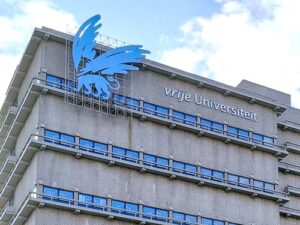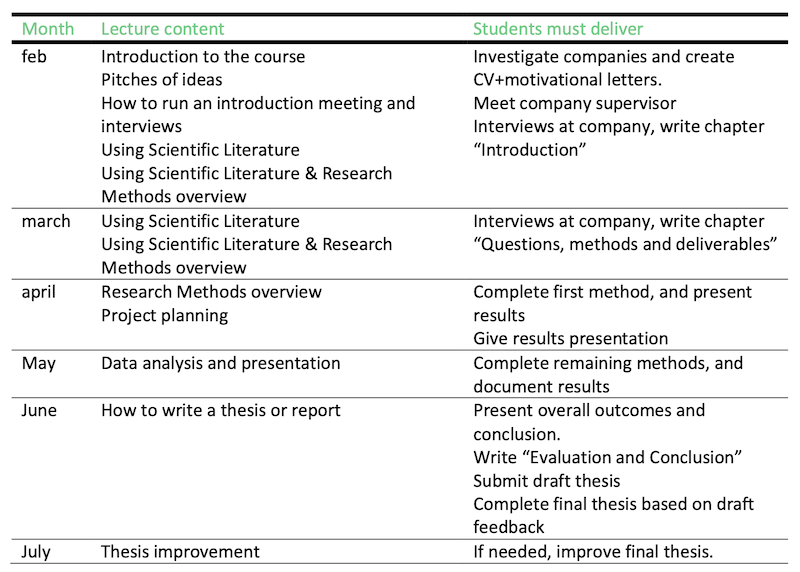VU university business track research projects
| Sieuwert van Otterloo |
Project Management

The Vrije Universiteit Business Track is a novel way for third year Computer Science students to complete their thesis. Instead of working individually on a purely academic problem, in this track they will work in small groups on a real business problem at a real company. We are looking for eight innovative companies with a research or data science team that are willing to contribute a problem and act as company supervisor. The projects will be completed from march – june 2024.
Why a business track
 As computer science matures, many theoretical problems have become practical problems: organisations have valuable data related to their business and are able to integrate new software systems, designs and algorithms. This is true not just for IT-companies, but also for logistical, facilities and retail companies and the public sector. For many students it is exciting to have access to data, learn to collaborate in a business setting and understand also the practical aspects of deploying IT in the real world. The Vrije Universiteit has a large and diverse group of talented computer science students, and wants to offer students interested in business application to work on real problems. The Vrije Universiteit has therefore asked Sieuwert and Joost to organize this in the form of a business track. In the business track, students will still make a complete thesis document and is graded individually. The main differences with the normal track are:
As computer science matures, many theoretical problems have become practical problems: organisations have valuable data related to their business and are able to integrate new software systems, designs and algorithms. This is true not just for IT-companies, but also for logistical, facilities and retail companies and the public sector. For many students it is exciting to have access to data, learn to collaborate in a business setting and understand also the practical aspects of deploying IT in the real world. The Vrije Universiteit has a large and diverse group of talented computer science students, and wants to offer students interested in business application to work on real problems. The Vrije Universiteit has therefore asked Sieuwert and Joost to organize this in the form of a business track. In the business track, students will still make a complete thesis document and is graded individually. The main differences with the normal track are:
- Students will work on a real business problem at a real company, with regular feedback from a company supervisor
- The students will work in a group of four or five students, that all work on a unique subproblem for the same company
- Instead of receiving only individual supervision from the VU supervisors, the students will receive a combination of lectures, group-feedback and individual feedback
- The track contains several well-defined intermediate deliverables and presentations, asvis common in business settings, that are designed to help students plan their effort towards a final thesis.
To make this track a success for both students and companies, we are looking for organisations that have data and problems to solve, and for managers / team leads that are interested in being a company supervisor for a group of students.
Timeline
Unlike many academic projects, the business track has a clear timeline with welldefined activities. Below is the monthly schedule. As you can see, companies will interact withe students from February 2024 until June 2024. In this short time frame, student teams must show weekly progress and deliver results incrementally. The VU lecturers (Sieuwert and Joost) will help the students manage this schedule. The company supervisors have more of a ‘product owner’ role: explain the intended result, provide access to the organisation and provide feedback.
Companies / organisations wanted
The Business Track provides organisations (companies or NGOs or public institutions) with the opportunity to have Computer Science Bachelor students to work on a real world problem. You can expect new ideas, data insights or software prototypes to help you explore and solve your problem. The problem must be computer science and data science related, and ideally can be split into 4-5 subproblems. Each subproblem must have a clear expected result, for instance a data science model, usability study, cleaned data set, software prototype or demo.
Suitable projects are for instance:
- Data Science projects (projects that relate to using business data to help solve business problems using analytics and machine learning).
- Innovative Software Development projects (projects that relate to using innovative solutions to new problems that result in a prototype that demonstrates the new algorithm/solution, it should therefore not be regular software development projects that only have working software as their final goal).
Many students have an interest in and experience in AI and machine learning. Some students are also interested in machine vision, NLP, openAI/prompt engineering, optimisation, low code development and usability research. To get some insight into past projects, please check our 2020 research agenda, and our overview of completed thesis projects. We are open to new challenges and domains, provided that the company has some domain experience and access to relevant data.
Each organisation makes one company supervisor available for 1-2 hours per week. They are the main point of contact. The company supervisor connects students as needed to other people in the company, so that each student can also conduct individual interviews. The effort per month is limited to a few business days, with a clear expectation per month:
- January: We expect company supervisors to create a written description of the problem to be solved.
- Feb – April: We expect the contact person to be available every two weeks for receiving a progress report, and answering questions in the report. If needed, the company supervisor calls the university supervisor to align the response.
- March and May: Read already completed thesis chapters and provide feedback.
- April and June: Attend a presentation by the students of results, and provide feedback. If needed, the company supervisor calls the university supervisor to align the response.
- June: Read final report, write an evaluation of the results of the work of our students (from a business perspective) at the end of the project
The company supervisor will at all times be supported by the VU lecturers.
How to apply
If you are interested in a company supervisor role, send a short mail to Sieuwert van Otterloo with a link to the company website, a short description of your role in the company and the project idea.
Dr. Sieuwert van Otterloo is a court-certified IT expert with interests in agile, security, software research and IT-contracts.


